Season four is far and away the worst season of ALF. There. That’s your review. It registered as shockingly awful to a guy who already hated the living fuck out of ALF.
Throughout the previous three seasons, ALF has been inane, idiotic, lazy, nonsensical, offensive, and irritating. Season four cranked all of those same dials to 11, and trimmed out any of the intermittently redeeming qualities as well, as though it was genetically engineered to be the worst possible version of something that was already pretty awful to begin with.
I can’t say I wasn’t warned, but I hoped against hope that I’d find something to enjoy here. I blame season three for my foolishness. See, people told me that season three was lousy, too, but I actually enjoyed it more than either of the first two seasons. It had some really strong episodes, I thought. Sure, it also had many really poor ones, but it was always at least interesting.
It kept me engaged. I may not have always liked what I was seeing — and may have outright hated a large portion of it — but it was…surprisingly watchable. And it led to what I honestly believe are some of the best reviews I’ve done. Good or not, the episodes gave us something to talk about, and in at least two notable cases, to debate.
So when I heard all of the negativity around season four, I figured it would be another season three situation: valid criticisms, for sure, but surely I’d still enjoy the journey.
Nope.
Everyone told me that season four was the worst, and it was still horrid beyond the worst of my nightmares.
That’s really a shame. As much as I complain about this show, it’s not entirely bereft of merit. It’s had its good episodes. It’s had its brief flashes of cleverness. And it’s had some funny lines. Shit, it’s even had effective emotional moments. (Not many, of course…but they’re in there.)
I guess what I’m trying to say is that even this late in the game, ALF is not beyond salvaging. At least, it shouldn’t have been. The season four we got, though, seems to have been designed with the intention of ensuring that nobody in the audience miss the show.
The first three seasons were hit and miss, to put it politely. Mainly, as we’ve said, they missed. But season four didn’t even bother to swing. It was waiting out the game, and seemed like it just wanted to go home.
I’m not speaking about the writing, the acting, the visual presentation, or anything else specifically; I’m speaking of all of these things. If there’s one overarching feeling specific to season four, it’s exhaustion.
But before we damn it for its crimes, let’s give season four its fair shake: there genuinely was good reason for them.
The show, at this point, was in a creative limbo. Season five would have seen ALF living at the Alien Task Force base, writing the Tanners out and effectively giving the show a soft reboot. He’d have new characters to bounce off of, new adventures to have, and could even re-live some of his old ones, since the new characters wouldn’t — in theory — have learned to handle him the way the Tanners did. (Of course, the Tanners never actually learned anything at any point, but it’s a nice thought.)
Exactly when the decision to move ALF out of the house was reached, I can’t say. Nobody else seems to know, either. But a few things point to it being reached fairly early in the season, if not before…mainly the fact that around a third of the episodes contain clear references to ALF moving on without the Tanners.
Really, if you ever decide to watch these episodes for yourself — you sick fuck — pay attention. Season four is full of characters thinking aloud about the possibility of ALF leaving, and starting over somewhere else. It’s possible this was coincidental, but pretty unlikely.
That doesn’t necessarily mean it’s overt foreshadowing…but it’s likely, to me, that the writers were working their own uncertainties about the future into the scripts. Not to any artistic end, and it may not even have been deliberate, but they were surely giving serious thought to what the show might become next season.
Because…well…what would the show be next season?
So ALF moves out. Fine.
Beyond that, what’s season five? Who will it star? What kind of characters will they play? What does the Alien Task Force base look like? Since the show will take place on the presumably secure base, will ALF be able to visit other environments, like he does now? Can there still be wacky neighbors? Will the fact that everyone ALF meets has the same job limit story possibilities? Can there be guest stars? If so, will they all have to play visiting generals?
What will the show be?
The writers didn’t know, and beyond “ALF moves out” there probably weren’t any definitive answers about the hypothetical season to come.
So the writers are uncertain not only about what the next season would include or not include, but what they’d be able to write about.
It’s on their minds. It bleeds into their scripts. Questions without answers, raised frequently, regardless of the actual plot unfolding behind them.
The writers, for once, are interested in something uniform, but it’s not something that excites them. It’s a cause of serious anxiety.
ALF, whatever it is or would become, is their job. They may not like it, but they know what’s expected of them. They can write for a nerdy old dweeb, a bitchy housewife, a horny teenager, and the kid who needs to ask an expository question once per episode lest they get sued for breach of contract. Oh, and any jokes they write had better go to the puppet.
Fun? No. Rewarding? Of course not. But the expectations are clear. They know exactly what they’re getting paid to do.
…for now. Until season four ends, and they’ll have absolutely no idea what they’ll be writing next.
I have sympathy for them. Working on ALF they certainly never got the opportunity to shine as sitcom writers, but by this point they didn’t even know what sit they’d be writing the com for.
On top of that, a number of previously reliable characters were M.I.A. Jodie was nowhere to be found. Jake was gone. Dr. Dykstra appeared, but only in a holdover episode from season three. Season four, therefore, didn’t utilize any of the show’s most valuable supporting players.
I don’t know why. I’d have to assume it was either a lack of availability or interest on the part of those actors, but I can’t say for sure. Whatever the case, the writers felt the pinch, and depending on when they found out about their availability, they may have even had to scrap whatever ideas or scripts they already had for those characters.
That would go a long way toward explaining season four’s reliance on retreads of earlier plotlines. After all, get stuck with a sudden deadline for a replacement script, and what are you going to do? Easy: something you already did before.
“Live and Let Die” was a less funny “Funeral For a Friend.” “Make ‘Em Laugh” charted the same meta-territory as “I’m Your Puppet,” to vastly diminished returns. “Mr. Sandman” was a lazier riff on the same dynamic we saw in “Night Train.” “Hungry Like the Wolf” had the exact same plot as “Wild Thing.”
The show was cannibalizing itself, running out the clock, worried about the future, disinterested in the present, and stuck with lesser characters that were added to the cast.
Yes, while the show went without its relatively strong players in season four, it gained a few new ones…and it was definitely a trade downward: now we had Neal, Robert, Eric, and Lucky II.
In the latter two cases, these characters had only one episode each that had anything to do with them. (“Baby, Come Back” for Eric, and “Live and Let Die” for Lucky II.) Eric at least appears — irrelevantly — in a few scenes throughout the season, but Lucky II literally vanishes from existence the moment after they introduce him.
One would be forgiven for wondering why they created Lucky II at all. At least Eric was the result of Anne Schedeen’s real life pregnancy; the character may have been worthless, but the necessity was clear. Lucky II, though, was an invention that the inventors themselves wanted nothing to do with. It’s weird, and I’m all ears if anybody has any theories.
More fruitfully, if no more impressively, Robert appeared in three episodes, and Neal appeared in five.
I’d be hard pressed to name any one of them that was worth watching.
Robert may have gone nowhere as a new character, but at least he was innocuous.
I don’t have any allegiance to Dean Cameron and I’m still not sure I’ve seen him in anything else, but he comes off decently in his episodes, especially when you consider how little he had to work with and how miserable the rest of the cast must have been by that time.
The puzzling thing about his character is why he was there at all, as he could have been playing a different character in all three of his appearances and it wouldn’t have made any less sense.
He initially showed up as a caterer in “It’s My Party,” was suddenly an elderly futuremime in “Future’s So Bright, I Gotta Wear Shades,” and then was just a normal, horny mime in “I Gotta Be Me,” where he became the first character to canonically plow Lynn.
He was introduced, apparently, to replace Danny from last season as Lynn’s steady boyfriend, even though she appeared to be single in other episodes when the plot (or a needlessly filthy joke) required her to either be single or not to mind cheating on him.
Why Danny was replaced at all, I have no idea. It may have been another availability / interest issue. But once thing’s for sure: the show never knew what to do with Robert, or even what it wanted to do with Robert. Oh, and a second thing’s for sure, now that I think about it: his episodes were fucking garbage.
But none of this was his fault. If I ever met the guy I’d feel inclined to congratulate him on managing to stay alive beneath the crashing waves of ALF‘s horseshit.
So Robert was worthless and confusing, but not horrible.
Neal, however, is another story.
Neal is easily the most puzzling aspect of season four.
At the time, Jim J. Bullock wasn’t a huge star, but he was certainly a sought-after sitcom presence. In a way, therefore, it’s not inconceivable that ALF would want to shoehorn him in as Willie’s previously non-existent brother. (And that’s not “never-mentioned” brother. Neal genuinely did not exist before the writers invented him; prior to this we were explicitly told Willie had only one brother, whose name was Rodney.)
In every other way, though, it’s fucking baffling: why would you want to shoehorn anyone into this show when all of the funny lines have to go to ALF anyway?
Sure, Bullock brings with him a certain amount of prime time clout, but if he’s just going to stand there making faces while ALF delivers ostensible woofers, do you really need him there? Couldn’t it be anybody? God knows the bar for acting talent wasn’t set so high that you couldn’t have gambled on some cheap no-name to play this thankless role.
And then there’s the simple fact of introducing important new characters when you know your show is bringing in an entirely different cast next season. Why bother? What possible impulse could there have been to introduce Neal?
Well, by my calculations, there’s exactly one possible impulse.
It’s highly likely that Bullock was a network-mandated addition to the cast. With a recognizable name you get viewers, and ALF‘s viewers were dwindling. It’s a business decision, simple as that.
But assuming this to be the case, why did the show not take advantage of him? The network forces you to bring in new talent, and you’re not in a position to push back. You’re stuck with this person…but it’s a person with significant sitcom experience.
So, as long as he’s there, why not give him something to do?
Of course, that’s an odd thing to say when he seems to have a lot to do. Neal, as you know, drives the plot of every episode he’s in, barring “Break Up to Make Up.”
Yet, he still doesn’t do much of anything.
Part of the reason for this is his complete lack of characterization. He’s utterly indistinct, sweeps in from nowhere, and vanishes just as quickly. He’s not a different character in each episode, like Robert is; he’s a different character from scene to scene, and from line to line.
He’s horny, he’d funny, he’s nerdy, he’s cool, he’s popular, he’s a pushover, he’s a moron, he’s lonely, he’s a lady killer, he’s a friend, he’s a nuisance…he’s whatever he needs to be at any given time to make the smallest possible impact on anything that’s happening.
It’s even more confounding when you realize that Neal arrives with his own arc, making him the only character (aside from maybe Kate Sr.) that’s ever had an explicit motivation to do anything: he’s starting his life fresh after a divorce.
That’s where we meet him. And we spend some time with him as he builds this new life, finds a new home, and gets a new job. Then his conviction is put to the test when his ex-wife returns and wants him back…and also isn’t a fat cow!
Add that up and it sounds suspiciously like a narrative, which is why it’s almost impressive how inconsequential any of it feels. ALF was actively sapping the promise out of things by this point.
Ultimately, the fact is that the effort invested in this show was at its lowest level yet. The writing was lazy, the actors defeated, and any opportunities to evolve the show or raise the stakes — such as Neal joining the cast, Willie taking a new job, or Lynn moving out — were shrugged off. ALF had plenty of opportunity to do interesting things as it drew itself toward its unintentional close, and it seemed determined to follow through on none of it.
There is one very interesting exception to that trend, though: ALF’s change of heart about eating cats.
That, oddly, stuck. And I have no idea why.
It’s possible that there was pressure from the network here, too. Evidently that’s why ALF stopped drinking (much) beer after the first few episodes; I don’t know that anyone ever actually complained, but the fear that ALF might be imitated by children meant that the show more or less entirely ditched his alcoholic tendencies. (Interestingly, he didn’t stop setting fires, stealing cars, lusting after underage girls, or punching Willie in the dick. But…y’know. Don’t drink a beer, kids.)
Here, though, I’m not sure. Would the network really have been concerned that children would stalk, murder, and consume stray cats? And if they were, why were they not concerned until the fourth solid year of that joke being told and re-told?
Whatever the reason, ALF decided he wouldn’t eat cats anymore in “Live and Let Die”…and then never tried to eat one again. Or even expressed his desire to do so. At least, not outside of “Make ‘Em Laugh,” where it was clearly framed as both a joke and a reference to his former life on Melmac. As far as present day and present company were concerned, ALF was done with that.
It was a daring move, as “ALF eats cats” is one of the only things that ever stayed consistent about the show…and also one of the only things anyone remembers about it. The fact that ALF undid that little bit of trivia for about a quarter of its run is significant…and frustratingly so, because it didn’t replace it with anything.
This was an opportunity for ALF to grow, in some way. Eating cats was about he only thing he gave a shit about. Take it away and you have room to give the character something else to desire.
In short, you bury the cheap running joke for something better, more important, more interesting. After all, it’s not like there were many other ways to tell the same cat-eating joke again. Discarding it feels…brave, actually.
But, of course, nothing really changes.
ALF stops talking about eating cats, but that’s it. There’s no new gag to take its place, no long-dormant character trait that comes to the fore in its stead.
It’s just one less thing ALF talks about. And I get the feeling that once the other writers are gone and Fusco has his own way, this aardvark creep will be back to craving cats in Project: ALF and all the other shit he’s in.
Still, I like the lack of cat-eating jokes. I like that a character grew in some way, even if it’s up to us to keep that change of heart in our minds, as the show never references it again.
But that’s almost the extent of what I enjoyed about season four. It pains me to report that.
One of the earliest pleasures of this review project was discovering that ALF could actually be pretty good, now and again. It wasn’t reliable, but it was something to tacitly look forward to, and to celebrate when it did happen. Every so often we’d get an episode that felt like it was beamed in from an alternate universe, in which ALF was not all that bad, really.
Season one had a few of those. Season two had a few of those. Season three had more of those. And even with my low expectations from this show, I thought I could count on season four adding another handful to that list.
But it didn’t.
By the time the season ended, only one episode really stuck out as being worth watching: “Lies.”
That one wasn’t a great episode. It wasn’t moving. It was, to be frank, not even interesting. But it was funny. It was silly. It was a welcome example of how to take a mundane situation — Willie forced to bluff his way through an interview with the media — and make it memorable.
I liked “Lies.” A lot. I’ll go to bat for that one. But it’s the only one in season four I can really say many nice things about, and that’s massively disappointing.
I joked many times throughout this series that it always seemed like we were watching first drafts, but season four really shows us what first drafts look like. The previous three seasons must have been second drafts at least, because I did not see true laziness or complete creative disinterest before this final batch.
This time around, none of the episodes felt like they mattered. I think that’s the problem. Granted, almost none of the previous episodes mattered to me, but I’d at least believe they mattered to somebody.
Here it seemed like writing enough pages to fill a cozy twenty minutes was enough. There was no desire to punch up the scripts, revisit them in the morning, or even check to make sure they made any sense.
So long as one scene followed another and eventually led to the end credits, it was good enough for ALF.
Which, I have to assume, is part of why there was no more ALF.
Ratings evidently fell in season four, and those fans who did continue to tune in weren’t getting whatever it is they used to like about the show. Even commenters here who still like ALF warned me against season four.
The tormented actors, the anxious writers, the confused plots, the frustrating additions and removals of characters, the reliance on the same tired jokes…it grated on viewers. It wore down their interest. Once they were sure they’d miss nothing, they stopped tuning in. For a long time, there were a lot of people out there who genuinely liked ALF. Season four tested and broke all of them.
The network had concerns, as you might imagine.
Brandon Tartikoff, then-president of NBC, tried to work actively with Paul Fusco to retool the show in a way that would win back viewers.
Fusco — shocker! — balked at the meddling, and refused, even though Tarikoff was the one who gave ALF a slot in the schedule in the first place. (In retrospect, Fusco was right to refuse the man’s assistance. After all, this guy was directly responsible for the success of Seinfeld, Friends, Cheers, The Golden Girls, Law & Order, The Cosby Show and other piles of crap nobody liked or remembers. What did he know?)
ALF coasted too long on good will, and when it finally needed some, it was gone. The show wasn’t greenlit for another season.
The show planned on reinventing itself with season five, and it foolishly used that as an excuse to skimp on season four, jogging in place until next season — the season it actually cared about — came along. By the time anyone saw that “To be continued…” message at the end of “Consider Me Gone,” the only valid reply would have been, “Who cares?” Viewers had just sat through twenty-four weeks of nothing happening. Why should they have been invested in what would not-happen next?
And, sure enough, nothing happened next. It was over. “Consider Me Gone” was an unfortunate and embarrassing cliffhanger without resolution.
But there was a shot at one. An offer to end the show properly was extended by Tartikoff, seen here breaking the news to ALF about season five:
As commenter Justin mentioned last week, Tartikoff offered Paul Fusco a TV movie to serve as a proper finale to the show.
And, man, talk about a class act. After the way Fusco refused his suggestions, sunk the show, and ruined careers in the process (seriously, every principal ALF actor was quite happy to dive right into permanent obscurity), Tartikoff was still willing to give him a chance to end the show respectably.
Paul Fusco’s entire career seems to have been based on others treating him better than he ever treated them, investing in him in a way he’d never invest in them, and giving him a chance to spotlight his talents in a way that he deliberately prevented others from doing.
Somehow this was not sustainable.
Once again, poor timing had the final say. Tartikoff moved on, and his less sentimental replacement — quite rightly in my opinion — realized that NBC didn’t owe Paul Fusco a living, and canned the idea of any TV movie. And that was the end of the story.
At least, for the time being.
A TV movie — in the form of Project: ALF — still happened, but it happened six years later, on a different network.
That’s what we’ll be covering next…and last. It’s not a feature-length episode of the show, however. No, ALF the sitcom is officially dead. Project: ALF was a bid for reinvention…and its dire reputation means I can’t even pretend it might have succeeded.
But we’re going to give it a fair appraisal after all. It was one last gasp for ALF, so let it be one last gasp for this review series as well.
Roll on, Project: ALF.
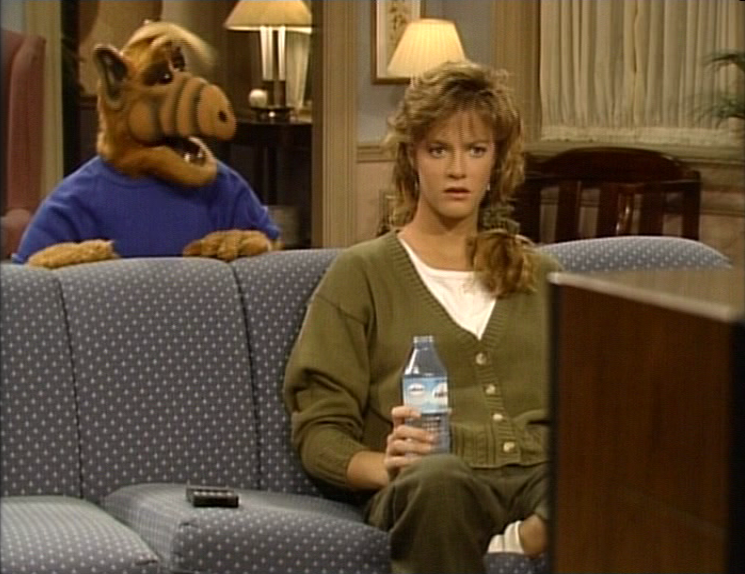
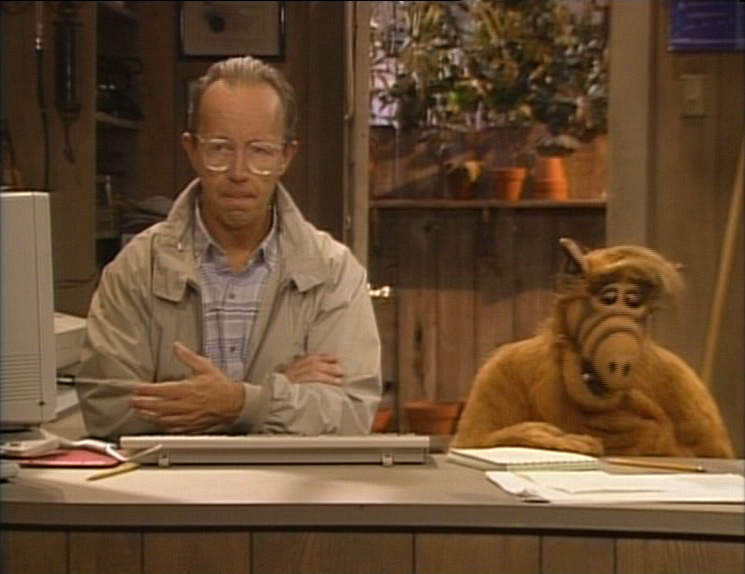

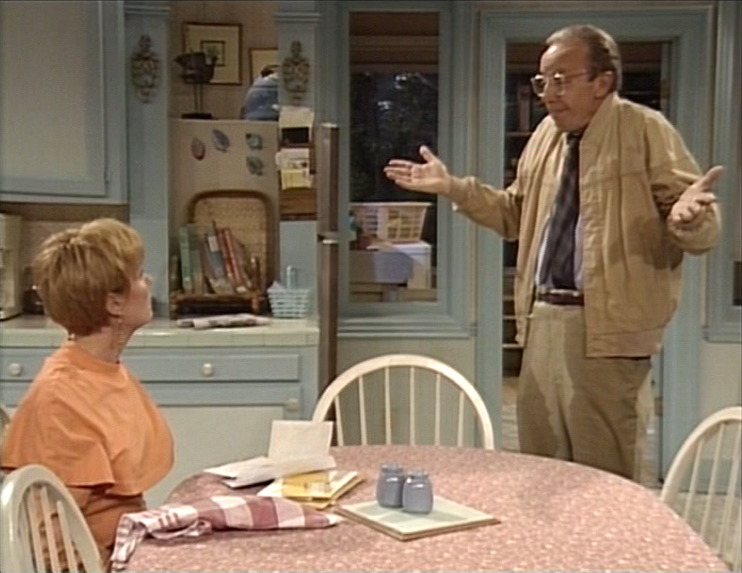



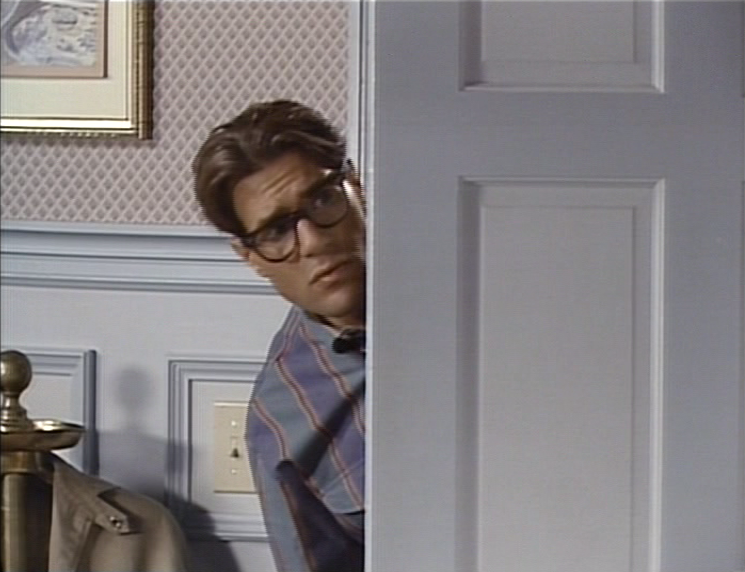
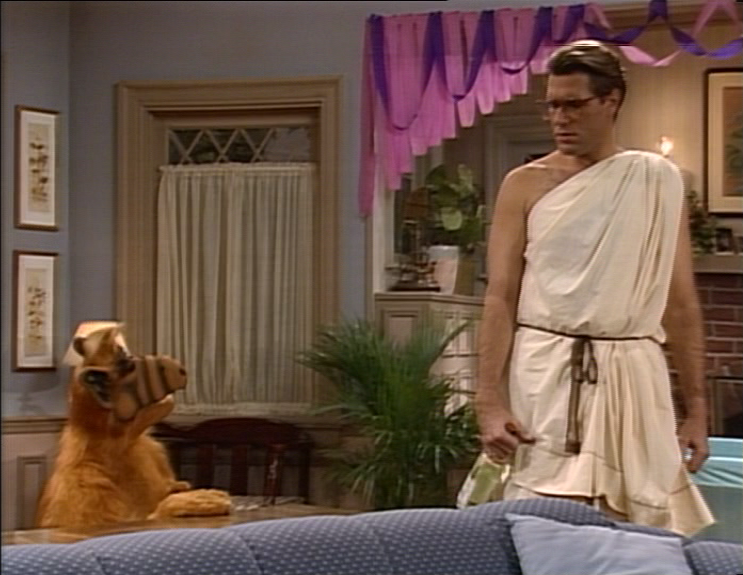
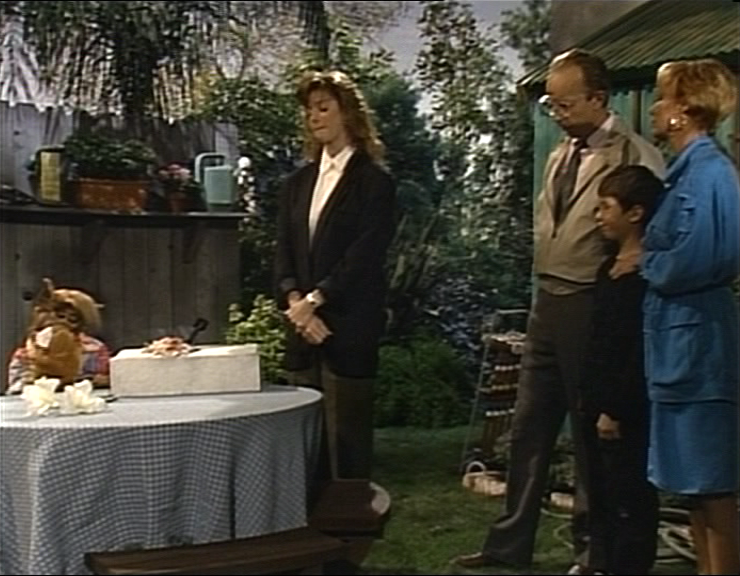

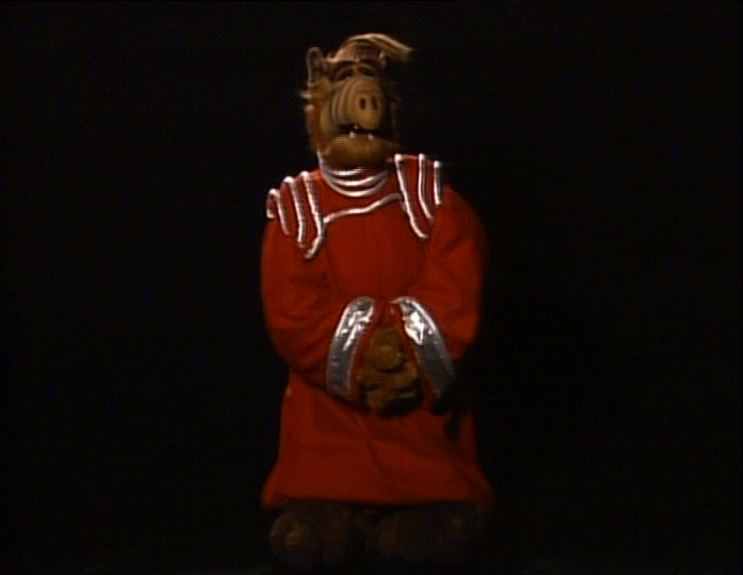
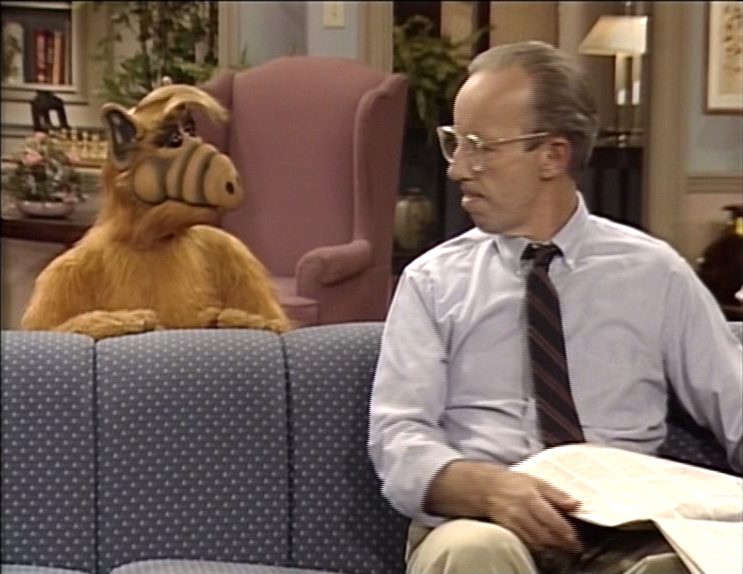

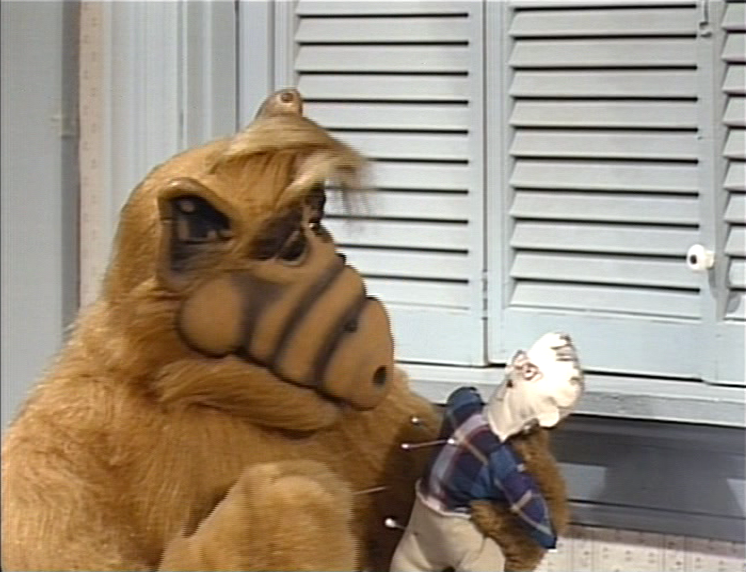

I have to wonder… Are audiences today more forgiving? Less discerning? Or is this show actually that much worse than some of the garbage we have on TV today that gets renewed for 10+ seasons? I suppose evil, disgusting gibberish like Two and a Half Men has (had? you be the judge) a certain amount of likability in the actors, who seemed to be having a better time than the poor bastards over at Alf. The Simpsons still makes a buttload of money for Fox, mostly through merch and associated products, so obviously that’s staying on. Modern Family has a weirdly “progressive” reputation, and still brings in the viewers. Do people just have a lower bar nowadays? Would Alf have thrived now?
“Would Alf have thrived now?”
–
God willing we will never find out.
“He’s horny, he’d funny, he’s nerdy, he’s cool, he’s popular, he’s a pushover, he’s a moron, he’s lonely, he’s a lady killer, he’s a friend, he’s a nuisance…”
He would pester any pest, drive a hornet from its nest, he would throw a whirling dervish out of whirl…
Unpredictable as weather, he’s as flighty as a feather –
He’s a darling-
He’s a DEMON-
..,He’s a Neeeaaalllll.
1) I love this. So much so I cannot find the words. As soon as what you were doing clicked for me, it became one of my favorite ALF comments. So thank you!
–
2) Since I gaveth with one hand, I’ll taketh away with the other: You just wrote the world’s first Neal Tanner fansong, which officially makes you the world’s first Neal Tanner fan.
Don’t make me create fanwork, sir. I will do it.
yeah, even as a die hard ALF fan like myself, i can agree that season 4 just didn’t hold up has well as the other seasons did. it wasn’t as wild or crazy as season 2 was and it wasn’t as thought provoking has season 3 was and it is often easy to tell the writers were struggling to keep this show alive by rewriting old plots and introducing new characters that they hoped would work out, but didn’t in the end. I think it is about half way thought the show that everyone realized ALF was tanking fast and that the dynamic of this show was no longer working, so they needed a drastic change to keep the show alive, which was ALF being capture by the Alien task force, but they still needed to fill in the quote for a season 4, so they just went with whatever ideas they could come with without thinking to hard about it and by the time season 4 ended it was all to little too late. so yeah,in a way this show dug it’s own hole by not caring enough about this season to keep viewers interested.
–
it often makes me wonder if another season would of really worked out? would such a drastic change in characters and setting really captured audiences again for a show that mostly everyone cared so little about at this point? i don’t of any sitcom that as successful done that, any sitcom tries to keep the dynamic the same because they know it works and when it doesn’t work anymore, the show just ends up getting cancelled.
I’d LOVE to know if anyone has examples of TV shows in which drastic setting/character changes worked out. The only thing that really comes to mind for me is Charles in Charge, which scrapped every character except for Charles (and his buddy Buddy) between seasons and introduced new ones. Oddly, if I remember correctly, the house in which the show too place stayed the same…only the family living in it was different.
–
Of course, Charles in Charge was hot garbage, but it didn’t kill the show, so I think that counts.
–
Blackadder had a new setting every time it returned, but the characters were largely the same (I’m simplifying here, but only because I don’t feel like writing an essay about Blackadder in the comments section). So that counts, too, but again it’s not a change in characters AND setting, like ALF was planning.
–
It’s a great question. I personally think the idea of moving the action to the Alien Task Force base could have been…interesting. Maybe not good. Maybe it wouldn’t have saved the show. But part of me wonders what that fifth season would have been like, at least, and that’s more than I’d wonder if the plan was just to have him listen to Willie and Kate fuck for another 20-odd episodes.
Good Morning Miss Bliss went from Indiana to California and dumped the main character and what ever became of Mikey Gonzalez? Valerie’s Family lost its main character and become the Hogan Family and then transitioned into Hogan knows best. Head of the class changed lead characters. I guess the tone of these shows stayed the same, but I am guessing ALF would have just had disinterested, disposable scientists instead of a disinterested disposable family. I tried to find that Nude picture of Sandy Hogan from the art gallery episode to post for you to admire, but couldn’t find it. On an embarassing note, I confused ALF’s own Josh Blake with Danny Ponce from Hogan’s Family.
Oh, and Melrose Place didn’t change the location or cast, but the whole tone of the show from a beverly hills 90210 with young professionals to a show about scandalized, sex filled story lines involving hard feelings and such.
Hmmm, the two examples I can think of for major cast/location changes are Welcome Back, Kotter and Scrubs, and both of their final seasons (the ones with the changes) sucked ass. I think the problem with making those kinds of shifts is that with the original, you have a set vibe, a rapport with the cast and audience that isn’t as likely to be repeated with the new changes.
Oh! Does Perfect Strangers count? They kept the two main characters and a pair of secondaries, but changed out the rest of the cast and one of the two major locations.
It’s so frustrating to see the pieces this season contains that could have been connected to make a whole season with some actual stakes.
.
You’ve got Neal, so driftless away from his wife he doesn’t have a set personality. He’s open to influence, so he becomes a partner-in-crime for ALF, something that I’m guessing Benji Gregory was meant to be but just didn’t have the energy to pull off. He’s a willing mouthpiece and tool for ALF’s attempts to take on government/entertainment/corporations, but on the flipside, their capers increasingly risk ALF’s discovery by the ATF. Stakes for ALF; stakes for the Tanners
.
An unsupervised toddler and a cat whose whereabouts are unknown. Two wildcards, and how hard would it be to have one of them crawl across Willie’s radio controls and change frequencies/turn on a mic while ALF is dispensing a Melmac fact.
.
And then you end the season with a two-parter featuring Neal’s wedding, the Lynn/Robert arc’s finish, and ALF’s capture. Of course, these require season-long plotting, which I suppose wasn’t really a thing yet for sitcoms then?
It wasn’t – at least, not that I remember. Sitcoms seemed to consist of a bunch of stand-alone episodes. Every so often, there might be a two-parter – but only within the season, not as an end-of-season cliffhanger.
–
Sometimes, massive changes were made to the series, but they happened within a single episode. Larry and Balki getting new jobs at the Chronicle (but even that was the beginning of a new season). Steve Urkel burning down Leroy’s (the teen hangout), but then Mother Winslow gives Aunt Rachel a blank check to but it and rebuild it into Rachel’s Place.
–
I really don’t recall sitcoms of that time introducing plot points throughout a season to pay off at the end.
–
Heck, even drama series like Star Trek took a while to plant seeds. Early TNG was mostly planet-of-the-week stuff. It was TOS in the modern (at the time) era. The “conspiracy” in season 1 was given exactly one episode of build-up prior to the titular episode. It took a while for them to introduce plot elements that would pay off later. Apologies to anyone that loves planet-of-the-week stuff, but I guess late DS9 spoiled me. And, wow, to go from that to the final two seasons of Voyager (planet-of-the-week) in my Netflix viewing feels like a massive step backward.
–
So, really, while it would have been interesting to see the ATF get closer to catching ALF throughout season 4, I don’t know if that was feasible (or even expected by anyone) at the time.
When I think of the fourth season, I think of ALF in a sweatshirt.
Okay… Yeah, even I remember the 4th season as not being as good as the previous seasons. I need to re-watch this show though. It has been so many yeas since I last watched a whole episode.
Man, I remember that when the final episode of season 4 aired, the cliffhanger was killing me, and because we didn’t really know TV schedules back then, I figured there was at least one more episode left in the season! I remember I was at the mall with my dad next week when I realized with horror that I forgot to set the VCR! It took probably five or ten years (I think it was after Project Alf) before I looked it up online and found out that that was indeed the last episode. I couldn’t believe it. This also means that evidently I was still watching Alf, though I only remembered like 3 of the episodes reviewed here, so I wasn’t watching very closely I guess.
Can’t wait for the Project Alf review, I think I’ll have to go back and rewatch it along with you. I was super excited for that TV movie, and I remember being pretty disappointed with the result. I think I just remember it being rather…boring. Anyway, thanks so much for doing all these reviews, I can’t believe I’ve been coming here ever week for so many years now! At least we’ll always have La Cucaracha and Night Train.
Yeah, Philip is wrong that no one cared about the show returning – they did! That cliffhanger was a nightmare because there was no internet back then. We didn’t know why the show hadn’t come back and why the cliffhanger was left unresolved.
Years later, NBC told Fusco they made a HUGE mistake in cancelling ALF and that they believed it had a couple more seasons left. [It’s on the ALF Wikipedia page.] So they can’t have thought it was that bad! Even in season 4 it still had good ratings that most shows would kill for today.
I think you’re being overly harsh on season 4 but then you don’t seem to like fondly remembered episodes like ALF’s Special Christmas (S2) so it makes sense. Each to their own, you’re entitled to your opinion. I still find it baffling that you would waste so much of your time watching something you’re indifferent about, but I’m glad you got something out of it – writing wise. I do wonder if you’ve watched the show again since you finished writing these reviews or if you’ve moved on.
I’ll always remember ALF fondly as the show I loved as a child. The show with world class puppetry and funny one-liners. Sadly as an adult I can see the flaws, the often poor storylines (which we have to remember have dated, most shows from the 80’s are better left as a memory) and the lack of character. Although they tried to flesh them out as the series progressed and I could argue that most sitcom characters are cardboard cutout cliches and that they never change – because then you have no sitcom. If ALF grows and learns too much then he’s no longer ALF.
Despite your often scathing reviews, I’ll always like the show (flaws and all) but I no longer watch it religiously like I did as a child. I catch the odd episode here and there. But then like you, I’m kinda bored with most television, preferring to watch films. Most writers think they’re being clever and original but everything has been done before, and if you’ve watched enough television, you recognize the plots and the reused ideas.
Thanks for the reviews. I still haven’t read them all and I may or may not go back. One things for sure, despite the harsh commentary (and I do think it’s overly harsh on a still – despite what you think – not forgotten and beloved show) you are an excellent writer.